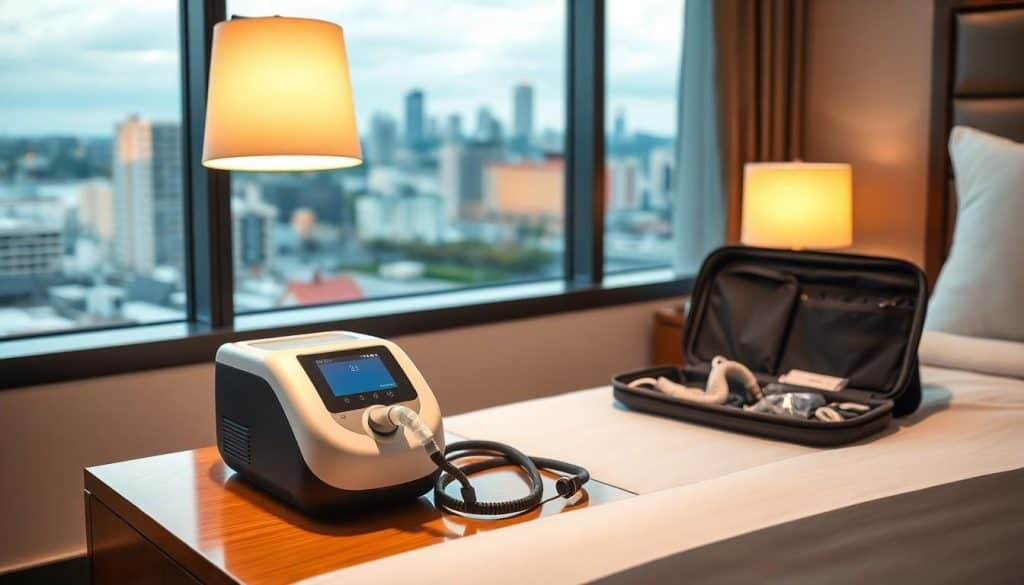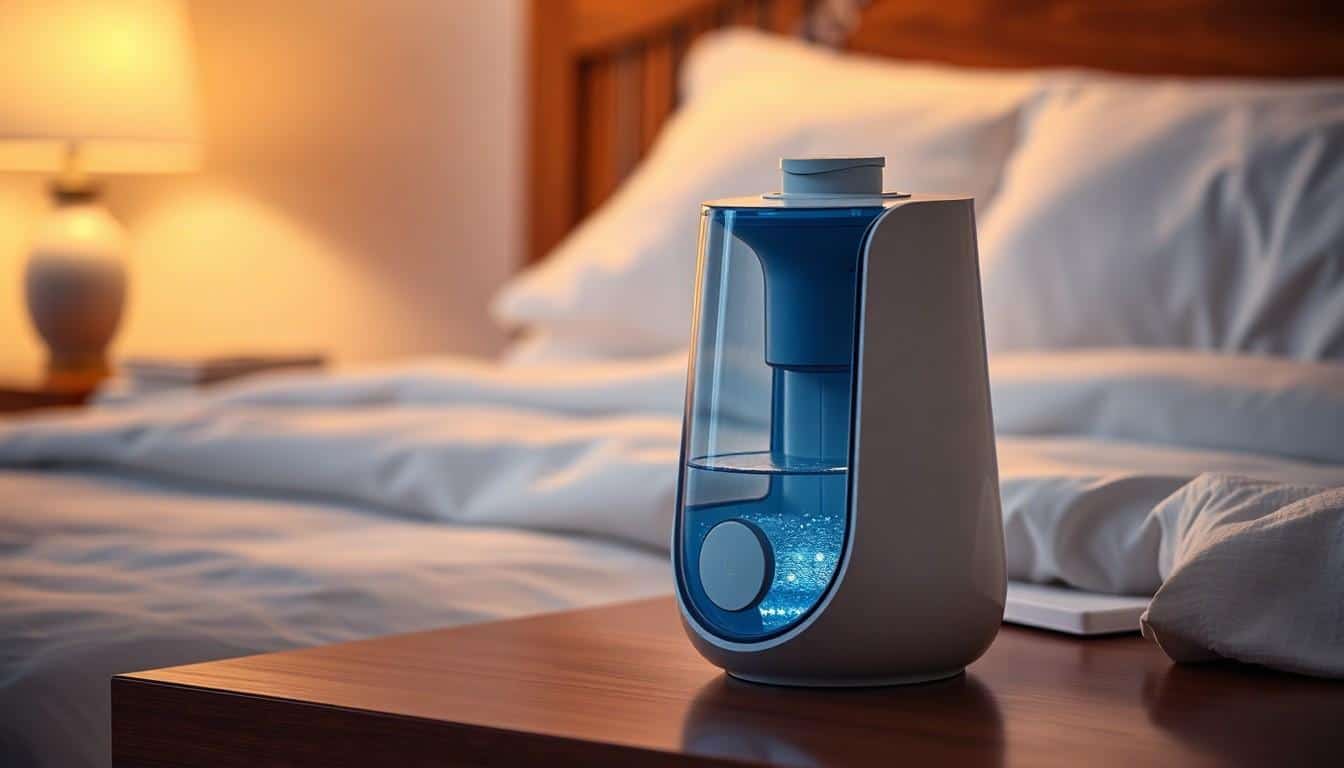Sleep apnea shouldn’t keep you from exploring the world. With travel CPAP machines becoming more compact and efficient, you’ll never have to compromise your sleep health while away from home.
Modern travel CPAP devices offer the perfect blend of portability and performance. These lightweight companions weigh as little as a pound and easily fit in your carry-on luggage while delivering the same therapeutic benefits as your home device. Whether you’re camping in the wilderness or staying at a five-star hotel you’ll find these portable machines ready to support your breathing needs throughout the night.
Key Takeaways
- Travel CPAP machines offer the same therapeutic benefits as standard devices while being 50% smaller and lighter, making them ideal for travelers with sleep apnea
- Modern portable CPAP devices feature smart technology, including Bluetooth connectivity, auto-altitude adjustment, and waterless humidification systems
- Leading models like the ResMed AirMini (10.6 oz) and DreamStation Go provide advanced features while maintaining ultra-compact designs
- Battery-powered options offer 8-16 hours of cord-free operation, perfect for camping, flights, or areas with limited power access
- Essential accessories include protective travel cases, universal power adapters (100-240V), and TSA-compliant documentation for hassle-free travel
What Are Travel CPAP Machines
Travel CPAP machines are compact devices that deliver continuous positive airway pressure therapy for sleep apnea patients during travel. These lightweight machines provide the same therapeutic benefits as standard CPAP devices while offering enhanced portability for maintaining sleep therapy away from home.
Key Features and Benefits
- Compact Design: Travel CPAPs measure 50% smaller than standard machines, fitting easily in carry-on luggage or backpacks.
- Lightweight Construction: The ResMed AirMini weighs 10 ounces, making it lightweight for travel mobility.
- Battery Options: Integrated power systems like the Z1’s PowerShell enable cord-free operation during flights or camping.
- Smart Technology: Built-in Bluetooth connectivity allows therapy tracking through smartphone apps.
- Noise Reduction: Advanced sound dampening keeps operation quiet at 25-30 decibels.
- Universal Power: Auto-adjusting voltage (100-240V) accommodates international travel needs.
- Size Comparison
- Travel CPAPs occupy 1/3 the space of standard machines
- Humidification systems use waterless technology instead of water chambers
- Tubing systems feature compact, collapsible designs
- Technical Specifications
- Pressure ranges from 4-20 cm H2O vs. 4-25 cm H2O in standard machines
- Built-in data storage limited to 7-14 days vs. 30+ days
- Simplified menu systems with essential settings only
- Operation Features
- Auto-altitude adjustment up to 8,000 feet
- Streamlined interface with fewer customization options
- Integrated power supply vs. external power brick
- Portability Elements
- Travel-specific carrying cases included
- TSA-compliant design for airport security
- Quick-disconnect tubing for faster packing
Top Travel CPAP Machines in the Market
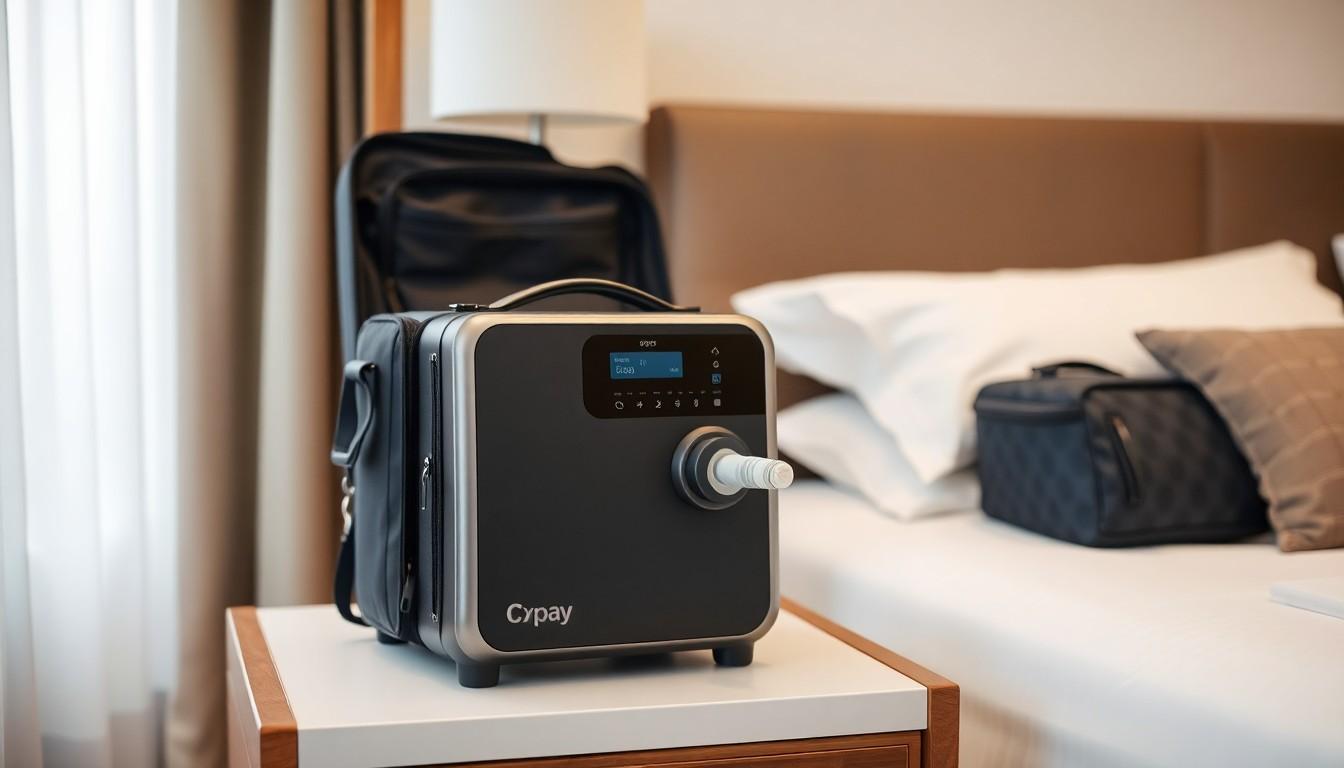
Travel CPAP machines combine portability with advanced therapeutic features to support sleep apnea treatment on the go. These devices incorporate smart technologies while maintaining clinical effectiveness in compact forms.
Ultra-Compact Options
The ResMed AirMini leads the ultra-compact category at 10.6 ounces, fitting comfortably in a palm. Its HumidX waterless humidification system eliminates the need for distilled water storage while traveling. The device operates at 25 dBA, making it suitable for shared accommodations.
The Philips Respironics DreamStation Go features an intuitive touchscreen interface paired with micro-flexible tubing for simplified packing. Its mask compatibility extends across multiple styles, accommodating different sleeping positions during travel.
Key specifications for ultra-compact CPAP machines:
| Model | Weight | Noise Level | Key Features |
|---|---|---|---|
| ResMed AirMini | 10.6 oz | 25 dBA | AutoRamp, SmartStart, HumidX |
| DreamStation Go | 1.86 lbs | 30 dBA | Touchscreen, Micro-flexible tubing |
Battery-Powered Models
Both the ResMed AirMini and DreamStation Go offer integrated battery solutions for cord-free operation. The AirMini syncs with a smartphone app for sleep data tracking and setting adjustments through Bluetooth connectivity.
Battery operation features:
- Extended runtime options ranging from 8-16 hours
- USB charging compatibility for versatile power access
- Sleep data storage during offline operation
- Automatic altitude adjustment up to 8,500 feet
These battery capabilities ensure continuous therapy in various travel scenarios, from camping trips to international flights.
Essential Factors to Consider
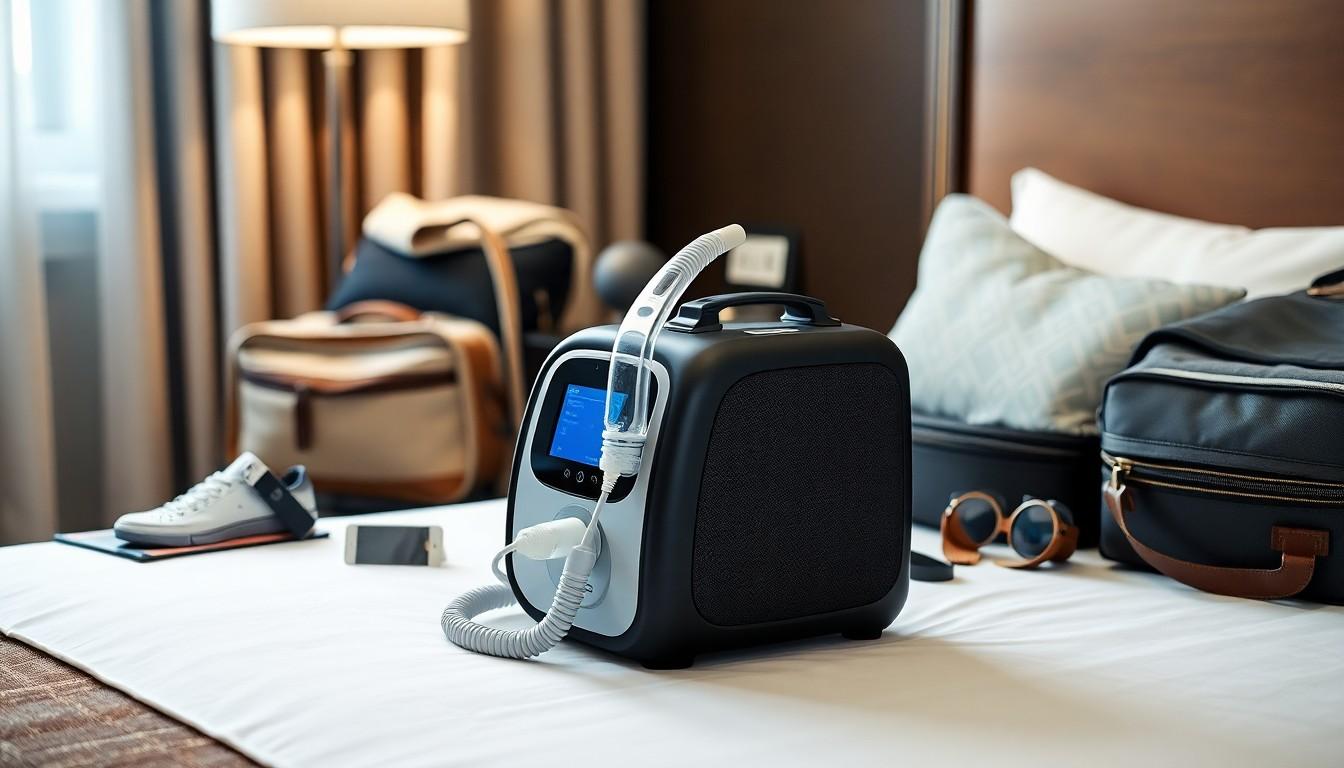
When selecting a travel CPAP machine, three critical elements impact your therapy experience during travel. Each factor contributes to the overall effectiveness and convenience of your portable CPAP solution.
Size and Portability
Travel CPAP machines feature compact designs optimized for mobility and convenience. The ResMed AirMini weighs 10 ounces and fits in a palm, while the Z1 CPAP Machine by HDM matches this portability at 10 ounces. These ultra-lightweight options reduce luggage space requirements and simplify transportation between locations.
Battery Life and Power Options
Power capabilities determine your therapy flexibility in various travel scenarios. ResMed AirMini delivers 1-2 nights of cord-free operation on a single charge. The Z1 CPAP Machine’s PowerShell battery provides one full night of uninterrupted therapy. These battery options enable treatment continuation during:
- Camping trips
- Long-distance flights
- Hotel stays with limited outlet access
- Remote locations
- Sound dampening technology
- Vibration reduction systems
- Quiet motor designs
- Strategic air flow management
| Machine Model | Weight (oz) | Battery Life |
|---|---|---|
| ResMed AirMini | 10 | 1-2 nights |
| Z1 CPAP | 10 | 1 night |
Accessories for Travel CPAP Machines
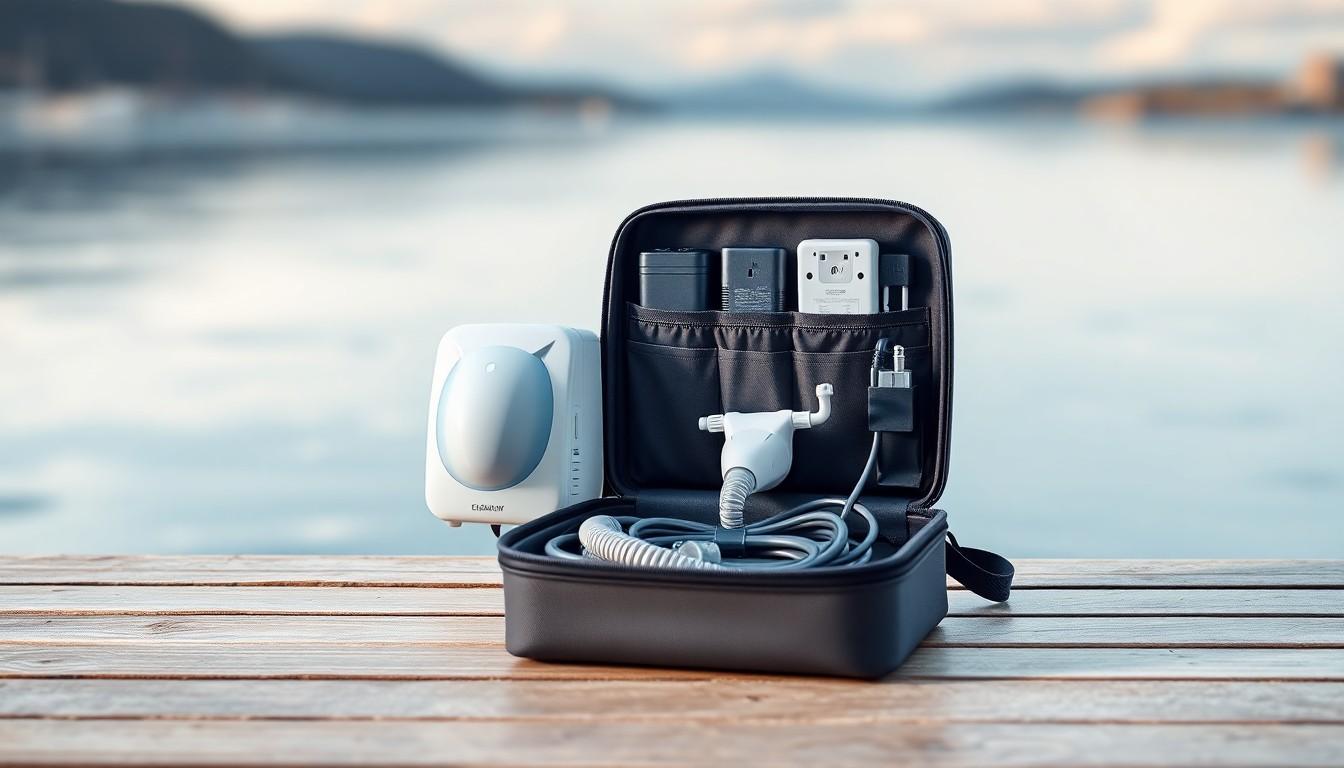
Essential accessories enhance the functionality and convenience of travel CPAP machines. These specialized components ensure optimal therapy performance during travel while maintaining portability and ease of use.
Travel Cases and Bags
Travel CPAP cases provide secure storage and protection for portable devices during transit. Specialized cases include padded compartments for the machine, tubing, mask, and additional accessories. Common features of travel CPAP bags include:
- Water-resistant materials to protect against moisture damage
- Multiple storage pockets for organized accessory storage
- Reinforced zippers for durability
- Shoulder straps or handles for comfortable carrying
- Compact dimensions that fit under airplane seats or in overhead compartments
Power Adapters
Power adapters ensure continuous CPAP therapy across different locations and power sources. Compatible power solutions include:
- DC power adapters for use in vehicles or aircraft
- Universal AC adapters (100-240V) for international travel
- USB-C charging ports for modern devices
- Battery pack connections for cord-free operation
- Backup power modules for emergency situations
Key specifications for power adapters:
| Feature | Specification |
|---|---|
| Input Voltage | 100-240V AC |
| Output Voltage | 12V/24V DC |
| Cable Length | 6-10 feet |
| Weight | 4-8 ounces |
| Compatibility | Multiple CPAP models |
These power solutions complement the ResMed AirMini and HDM Z1’s integrated battery options, which provide 1-2 nights of cord-free operation.
Travel Tips for CPAP Users
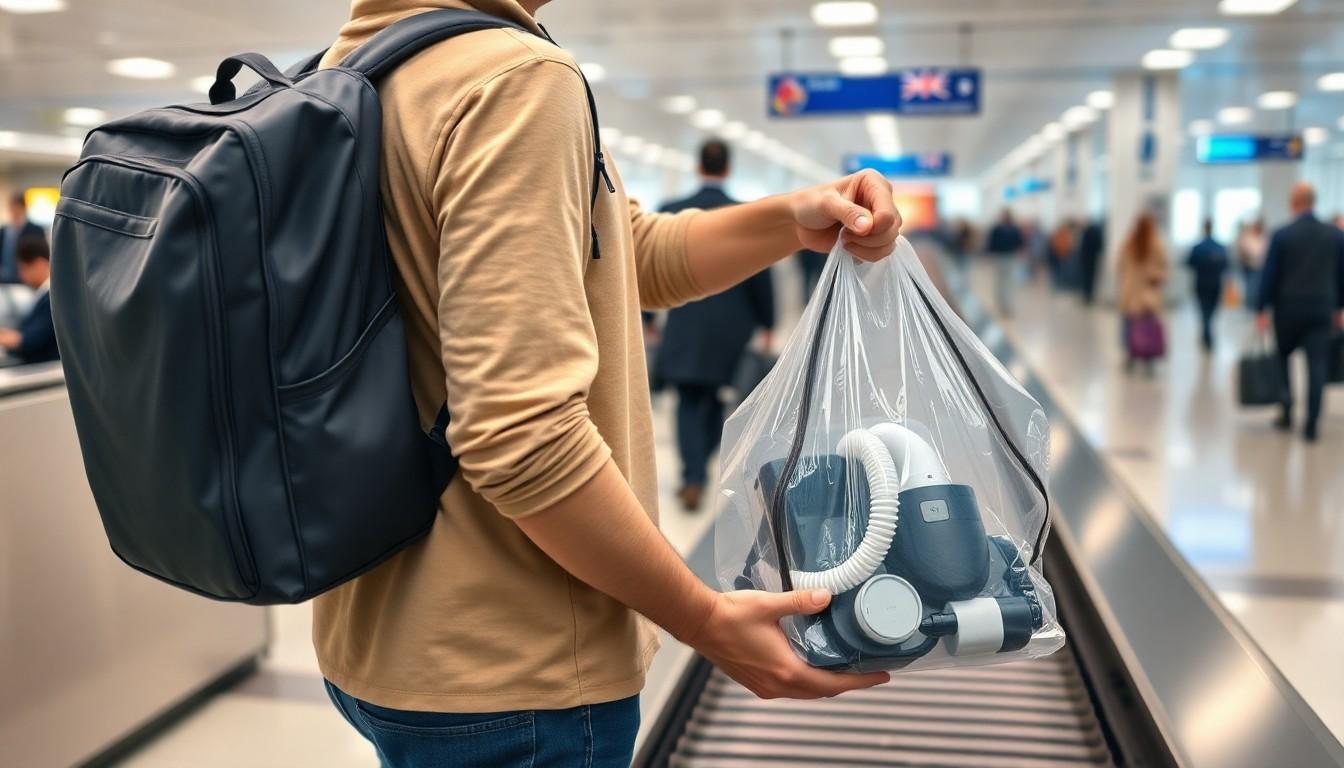
Travel CPAP machines provide essential therapy while meeting transportation requirements for both domestic & international travel. Here’s how to navigate security protocols & maintain your device during trips.
Airport Security Guidelines
Pack your CPAP machine in a separate, clear plastic bag to streamline security screening. The TSA classifies CPAP machines as medical devices, exempting them from standard carry-on restrictions. Present your medical equipment card & prescription during screening to expedite the process.
| CPAP Security Requirements | Details |
|---|---|
| Carry-on Status | Exempt from limits |
| Required Documents | Medical card & prescription |
| Screening Process | Separate screening bin |
Maintenance on the Go
Clean your CPAP components daily using CPAP-specific wipes or portable cleaning solutions. Replace disposable filters every 2-4 weeks & inspect tubing for damage or wear. Pack extra supplies:
- Mask cushions for extended trips
- Backup tubing sections
- Disposable filters
- Distilled water packets for humidifier tanks
- Sanitizing wipes approved for CPAP equipment
| Maintenance Schedule | Frequency |
|---|---|
| Daily Cleaning | Mask & tubing |
| Filter Changes | 2-4 weeks |
| Mask Replacement | 3-6 months |
| Tubing Inspection | Weekly |
Text in the tables and lists is deliberately kept minimal and focused on essential information to maintain clarity and avoid redundancy with the paragraph content.
Conclusion
Modern travel CPAP machines have revolutionized sleep therapy for people on the move. You’ll find these compact devices offer the perfect balance of portability and performance while maintaining essential therapeutic benefits.
Whether you’re camping in remote locations or staying at luxury hotels these innovative machines ensure you won’t miss a night of quality sleep. With advanced features like smart tracking waterless humidification and extended battery life you can confidently manage your sleep apnea anywhere in the world.
The future of travel CPAP technology continues to evolve making it easier than ever to prioritize your sleep health while exploring the world. Don’t let sleep apnea hold you back from your travel dreams.
Frequently Asked Questions
Are travel CPAP machines as effective as regular CPAP machines?
Yes, travel CPAP machines provide the same therapeutic benefits as standard machines. They deliver identical pressure settings and maintain similar treatment quality, just in a more compact design. The only main difference is their size and portability features.
How much do travel CPAP machines weigh?
Modern travel CPAP machines are incredibly lightweight, typically weighing between 10-15 ounces. Popular models like the ResMed AirMini and Z1 CPAP Machine weigh just 10 ounces, making them ideal for travel.
Can I take my travel CPAP machine through airport security?
Yes, CPAP machines are permitted through airport security as medical devices. They don’t count toward carry-on limitations. Pack your device in a clear plastic bag and carry your medical equipment card and prescription to expedite screening.
How long do travel CPAP batteries last?
Most travel CPAP batteries provide 1-2 nights of therapy on a single charge. The exact duration depends on pressure settings and whether you’re using features like humidification. Models like the ResMed AirMini typically last 1-2 nights per charge.
Do travel CPAP machines require distilled water?
It depends on the model. Some travel CPAPs, like the ResMed AirMini, use waterless humidification systems. Others may require distilled water packets. Check your specific model’s requirements before traveling.
Are travel CPAP machines noisy?
No, modern travel CPAP machines are designed with advanced CPAP noise reduction technology. Most operate at around 25-30 dBA, which is quieter than a whisper. The ResMed AirMini, for example, operates at just 25 dBA.
Can I use my travel CPAP machine internationally?
Yes, most travel CPAP machines are designed for international use. They typically come with universal power supplies that work with 100-240V systems. Just ensure you have the appropriate power adapter for your destination.

